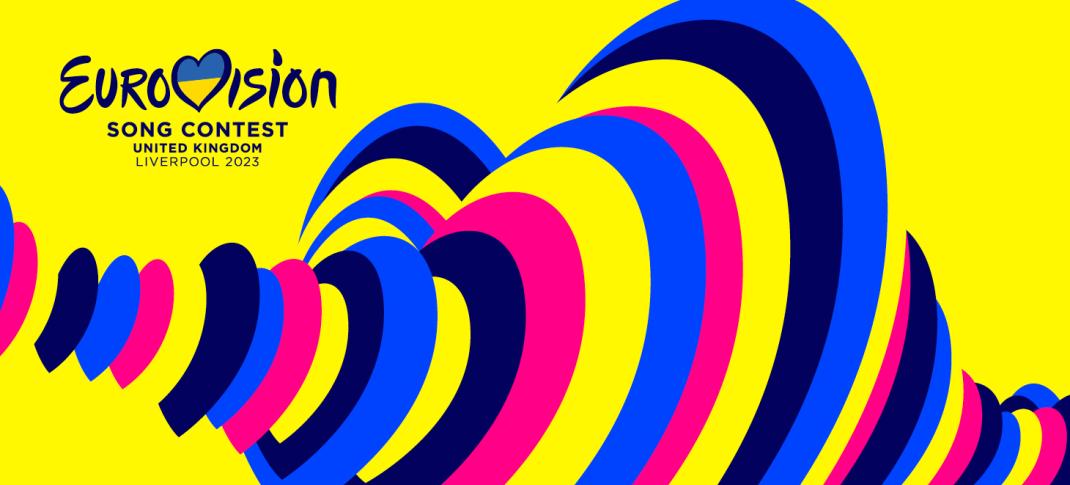Eurovision Draws Semi-Finals Schedule As Contenders Are Set

Eurovision 2023 Slogan "United By Music" and key art mixing the Ukrainian and U.K. national colors.
BBC
Despite Ukraine winning Eurovision 2022 in one of the most emotional finals in recent memory, the 2023 contest is happening in the U.K. due to the Ukrainian capital of Maripol not being secure enough for a global dance party. This has the side benefit of the cash-strapped country, which needs to spend its dollars elsewhere, being able to lean on the BBC to host and fund many of the run-up parts of the contest, starting with the traditional yearly Allocation Draw that determines the semi-final schedule. Though the production is technically a joint one produced by the BBC and Ukraine’s UA:PBC, the BBC was front and center, with presenters Rylan and AJ Odudu running the show.
This year’s contest has 37 contenders atThe “Big Five,” the countries who provide the backbone of funding for the event — Italy, Spain, France, Germany, and the U.K. — and Ukraine, as last year’s winner/this year’s (co)host are given direct passes to the Grand Final without having to perform in the semis, leaving 29 countries to be divvied out over the Tuesday and Thursday night performances. The odd number also means an uneven spread, with Tuesday landing 15 performances while Thursday will have 16. Since only the countries competing can vote on their Semi-Final night, those with passes to the Grand Final also get drawn to see which semi-final they will vote in.
The countries who landed in Tuesday’s lineup with the slightly easier night include Serbia, Latvia, Ireland, Norway, Portugal, Croatia, Malta, Sweden, Moldova, Switzerland, Israel, Netherlands, Finland, Azerbaijan, and the Czech Republic. (This is in order of the draw, the performance order will come later once everyone’s artists have been set.) Thursday’s Sweet 16 wound up with Armenia, Cyprus, Romania, Denmark, Belgium, Iceland, Greece, Estonia, Albania, Australia, Austra, Lithuania, Slovenia, Georgia, and Poland. Germany, France, and Italy will vote in the first semi-final on Tuesday, while Ukraine, Spain, and the U.K. will vote on Thursday for the second semi-final.
As for who will be representing these countries, each country gets to decide how it goes about making a selection. Some countries, like Israel, will choose to keep it in-house, which is why it was one of the first to announce its contender. Others, like Germany, usually hold a national contest in which the public whittles down the contestants to pick a winner. (What, did you think American Idol came out of nowhere? No, it was just a rip-off of the Eurovision National Contesta, except Kelly Clarkson had nowhere to compete internationally after winning.)
Though holding National contests are usually last to announce their contestants, and with the majority doing some variation on a National Contest to drum up interest, most winners haven't been selected yet. However, some are already known, like the aforementioned Israel, with Noa Kirel's "Unicorn." Other internal selections include Greece with Victor Vernicos' "What They Say" and Slovenia with Joker Out's "Carpe Diem." As for National Contests which have finished, there's Albania's Albina & Familja Kelmendi with "Duje," Belgium with Gustaph's "Because of You," and Ukraine with Tvorchi's "Heart of Steel."
The next batches of winners will come on February 4th and 11th, with the final contests ending in mid-March. The Eurovision Semi-Finals will be held on Tuesday, May 9, and Thursday, May 11, 2023, at 8 p.m. BT (That's 3 p.m. ET in the U.S.), with the Grand Final arriving on Saturday, May 13, 2023. This year Americans will be allowed to vote in the Grand Final, which will stream here on Peacock.




